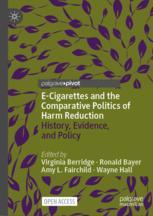OA Books - Supporting the SDGs: E-Cigarette Policies
In this series of interviews, we talked to authors and editors of books about how publishing open access (OA) has extended their impact and reach, something that is especially important to topics supporting the UN Sustainable Development Goals (SDGs).
We spoke to Virginia Berridge, co-Editor of the OA book E-Cigarettes and the Comparative Politics of Harm Reduction which offers the first in-depth study of the history and current debates surrounding electronic cigarettes comparing the UK, US and Australia.
 Could you share a short introduction to your OA book?
Could you share a short introduction to your OA book?
The book is a collaborative product which examines policy on electronic cigarettes in three countries: the UK, Australia, and the United States. These devices have been the subject of ongoing controversy since their introduction, with debate about whether they encourage smoking or are a route out of it. The three countries have followed different policies, with the UK supporting e-cigarettes as a harm reduction tactic for smokers, while Australia has effectively banned them. The US has a cessation-only anti-tobacco agenda. The book argues that such widely differing approaches are rooted in the different regulatory and policy-making apparatuses of the three countries with a strong tradition of harm reduction through nicotine in the UK.
WHO policy has been important - in the UK, it has been getting the smoker to stop, while in the other countries the traditional public health focus on children and youth has been to the fore. The book provides a comparative case study in the relationship between history, evidence and policy.
Which SDG(s) is your book related to?
SDG3 - Good health and Wellbeing
Do you see the importance of publications supporting the SDGs increasing?
Yes, and hopefully some will be based in the discipline of history as ours is. It's important to take that long term view and to understand the deep-rooted basis of present day issues.
Why did you choose to make your book available on an open access basis and how was the open access fee (book processing charge) funded?
Our comparative research was initially funded by a small grant from the Wellcome Trust Wellcome (reference 209524/Z/17/ZE). It’s a requirement of Wellcome funding that products are published open access.
Welcome approved the decision on open access (small grants do not always result in books) and the fees were then processed and paid by the open access fund which exists at the London School of Hygiene and Tropical Medicine, where I am based.
How were you hoping that open access would help with achieving your goals?
We had spent much time working together on the comparative study and wanted to make a contribution to the policy and public discussion which is often polarised between opposing positions. Our book is not beholden to one side or other in the debates. It is important that an analytical and long term approach to policy gets a hearing.
What benefits of impact have you seen from publishing this book open access?
A big benefit has been the large number of initial downloads (5,584). There are many networks in the field - not only historical ones, but also nicotine and e-cigarettes research groups, as well as policy-makers who would be interested in the topic, to whom links could be circulated. A hard copy is available and that will be reviewed eventually by journals in the usual way, but open access has helped with getting instant access to a rapidly changing policy field.
Do you have any advice to others considering publishing their next book or chapter open access?
Obviously, this was massively helped for us by having the financial support from the Wellcome Trust funding. Others might consider how a funder could be involved.
Why did you choose to publish this book with Springer Nature?
We chose Palgrave as our publisher (now part of Springer Nature) because their history programme has a good reputation with historians of health and medicine. In particular, we chose it because they publish Palgrave Pivots, short books (50,000 words maximum) which are generally published within a short time from submission of the final manuscript. In a rapidly changing area, it was important to us that the book published quickly, as we didn’t want the book to be overtaken by events.
Would you publish open access again?
This is the first book I have published open access. I have published articles in journals open access previously. It is a useful way of getting material to an audience quickly without waiting for reviews to come in (although we hope that the book will be reviewed as well). I would certainly consider it again given the right funding.
Take a closer look at E-Cigarettes and the Comparative Politics of Harm Reduction. We also invite you to visit the Springer Nature SDG Programme hub, which includes the SDG OA Book page and hubs for all the SDGs, including SDG 3 Good Health and Wellbeing.

About the Author
Virginia Berridge is Professor of History and Health Policy at the Centre for History in Public Health, London School of Hygiene and Tropical Medicine, UK.





